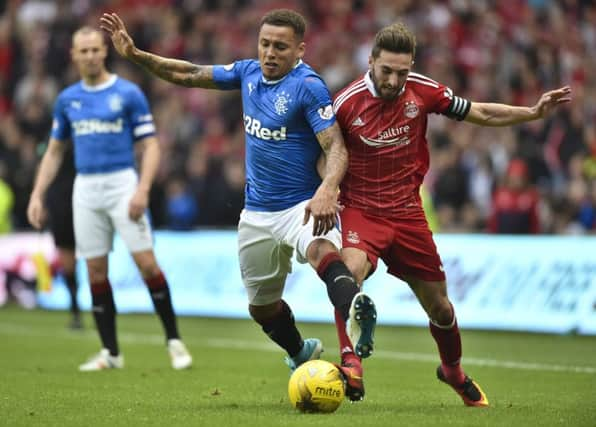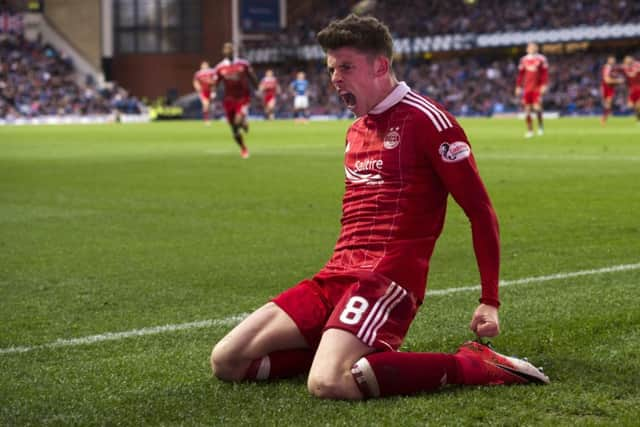Five things we learned about Rangers 2 - 1 Aberdeen
This article contains affiliate links. We may earn a small commission on items purchased through this article, but that does not affect our editorial judgement.


Aberdeen opt for heavy metal football
The methodology favoured by the likes of Liverpool manager Jürgen Klopp was on display yesterday evening as Derek McInnes’ side played at a high intensity from the first whistle.


Advertisement
Hide AdAdvertisement
Hide AdAdam Rooney was back into the starting XI with a supporting cast of Niall McGinn, Kenny McLean and Christie, who were consolidated by the midfield base of Shinnie and Anthony O’Connor in a familiar 4-2-3-1 shape. Spearheaded by Rooney who defended from the front, the midfield were unrelenting in their pressing of a young Rangers side, who struggled to cope with Aberdeen’s hassling and harrying.
It bore fruit with just nine minutes on the clock as Shinnie once again revealed his bulldog tendencies, out-muscling Josh Windass and latching on to a neat exchange from Andrew Considine and McGinn to finish. The away side adopted a high line for much of the game, which unnerved a hesitant Rangers backline who were evidently instructed to play out from the back as much as possible in a bid to retain possession. While Aberdeen were guilty of sitting deep in the latter stages of the game, McInnes’ tactical approach was responsible for getting his side a strong lead to protect.
Wes Foderingham performs
As Pedro Caixinha prepares to rebuild his side for next season, he can take solace from the fact that one position he need not worry about is the number one spot.


The goalkeeper was in fine form, conveying his agility and fine reflexes with a number of excellent saves to deny first-half efforts from Ash Taylor and McGinn. Admittedly, the Englishman was not helped out by his defence, whose inexperience created uncertainty and ultimately proved costly in the concession of both goals.
Perhaps most impressive was his alert reaction as David Bates gifted Aberdeen possession on the edge of his own area. Foderingham’s decision making proved astute as he emerged from his line at speed to win the ball cleanly from McGinn in a precarious situation. Once Aberdeen retrieved the ball and worked it back into the box, the goalkeeper had retreated, positioned himself well before producing another fine block to prevent Rooney from extending his side’s lead.
Despite reservations that some may have on his ability to command his area, performances like this show that Foderingham is a capable goalkeeper at Scottish Premiership level. However, he will definitely require more experienced individuals in front of him if Rangers are to take second place next season.
Anthony O’Connor might have played his way into a Scottish Cup final
The Irishman’s displays at centre-back have lacked in consistency but since replacing the injured Ryan Jack in a deep-lying midfield position, he has taken the opportunity in his stride. While he may not have as extensive a range of passing as his captain, O’Connor’s aggression, tackling and relative composure on the ball make for a player that suits the position well.
Advertisement
Hide AdAdvertisement
Hide AdThe inclusion of O’Connor in midfield alongside Shinnie, allowed for added stability when Aberdeen were not in possession. During Rangers’ period of ascendancy following an exquisite lofted finish from Martyn Waghorn, O’Connor’s presence meant that Aberdeen could revert to what was almost a back five and deal confidently with more direct passages of play.
O’Connor’s sequence of performances against Hearts, Celtic and Rangers now surely mean that he is the favoured candidate to start in the Scottish Cup final on the 27 May, providing Jack fails to recover.
Rangers overly reliant on ageing Kenny Miller
The management team’s need to rebuild in the summer has become ever more evident. Much of Rangers’ inspiration seems to originate from the stand-in captain, who has recently been deployed in a deeper position to breathe experience and nous into a cobbled together midfield.
Remarkably the 37-year-old’s drive and technique have not dwindled in his twilight years, a notion characterised by an instance in the first half when Miller charged down Mark Reynolds before showing the presence of mind to look up and pick out Joe Garner on the edge of the box, who curled an effort narrowly wide of the post.
However, the team’s over-reliance on the veteran emphasises the extent to which Caixinha must rebuild and do so shrewdly in the summer. The club has several fringe players tied down on long-term deals, while the team’s main creative outlet Barrie McKay is yet to verbalise where his future lies.
Whether the financial cost of completely overhauling the team is something that the board are willing to take on remains unclear, but the necessity of change is there for all to see.
A week to forget for Pedro Caixinha
From publicly declaring his interest in Aberdeen’s captain and discussing cycles needing renewed, to all but burning his bridges with opposite number Derek McInnes, the past week has been somewhat of a diplomatic disaster for the Portuguese manager.
It seems Caixinha’s natural disposition to be open with the press, as shown initially by his decision to release team lines in advance of a clash with Kilmarnock, is getting him into trouble. Had the Rangers boss managed to secure the three points last night, his comments this week and success in getting under the skin of his counterpart might have been regarded as an expert execution of mind games but ultimately Caixinha has to be judged on his team’s results. His side were arguably too open yesterday and McInnes’ greater experience in Scottish football proved to be the difference, as his side were able to exploit Rangers’ fragility.
Advertisement
Hide AdAdvertisement
Hide AdThe manager capped off a bizarre week of media relations by suggesting that McInnes is envious of his position, in the process coming across as a figure that might be feeling the pressure of managing a big club. The season coming to a conclusion and the opportunity to regroup in the summer will be a welcome respite for a team seeking dramatic improvement.
